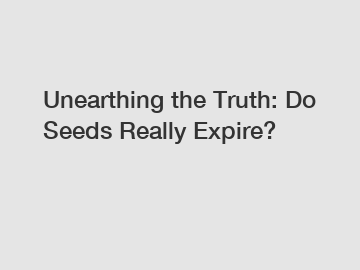Unearthing the Truth: Do Seeds Really Expire?
Unearthing the Truth: Do Seeds Really Expire?
Seeds play a fundamental role in the world of gardening and farming. They are the tiny capsules of life that give rise to a vast array of plants, fruits, and vegetables. As any gardener knows, the success of a garden depends largely on the quality of the seeds used. But have you ever wondered if seeds actually have an expiration date? Can they remain dormant for years and still grow into healthy, vibrant plants? In this article, we will delve into the intriguing world of seed viability and uncover the truth behind the question, "Do seeds really expire?".
Understanding Seed Viability.

Seed viability refers to the ability of a seed to germinate and grow into a healthy plant. This viability can vary greatly depending on the type of seed and its storage conditions. Generally, seeds tend to have a higher rate of viability when they are fresh and properly stored. However, this does not necessarily mean that expired seeds are completely useless.
Factors Affecting Seed Viability.
Several factors can influence the viability of seeds over time. One of the primary factors is the type of seed itself. Some seeds, like those of beans or lettuce, tend to have a shorter shelf life compared to others. On the other hand, seeds from plants such as tomatoes or peppers can remain viable for several years under proper conditions.
The storage conditions can also greatly impact seed viability. Seeds should be stored in a cool, dry place to prevent moisture and heat from affecting their quality. Additionally, exposure to light can be detrimental to seed viability, so it is crucial to keep them in a dark environment.
Testing Seed Viability.
If you have old seeds lying around, you may be questioning whether they are still worth planting. Fortunately, there are simple tests you can perform to determine the viability of your seeds. One such test involves placing a small number of seeds on a moist paper towel and keeping them in a warm environment. After a few days, check the seeds to see if they have germinated. If a majority of the seeds have sprouted, it indicates that they are still viable.
Another test involves conducting a water float test. Place the seeds in a container of water and observe if they sink or float. If the seeds sink, they are likely to be viable, whereas floating seeds may have lost their viability and are less likely to germinate.
Reviving Old Seeds.
In some cases, even if the seeds have low viability, they can still be successfully sprouted. Techniques like scarification, which involves scratching or nicking the seed coat, or stratification, where the seeds are subjected to a period of cold and moist conditions, can help awaken dormant seeds.
So, Do Seeds Really Expire?
While seeds do have a shelf life, it is not always a firm expiration date. The viability of seeds gradually decreases over time, but they can remain viable for several years, especially if they are stored under optimal conditions. Performing viability tests and employing specific techniques to revive dormant seeds can significantly increase the chances of successful germination.
In conclusion, the idea that seeds have a concrete expiration date is not entirely accurate. With proper storage and testing of seed viability, you may be able to bring seemingly expired seeds back to life. Remember to always check the freshness of your seeds and store them correctly to maximize their viability. So go ahead and embark on your gardening journey with confidence, knowing that even old seeds may hold the potential to blossom into beautiful plants.
For more information or assistance, do not hesitate to contact us. Happy gardening!
The company is the world’s best Vegetable Seed Wholesale Suppliers, Watermelon Seed Suppliers, china cheap celery seeds supplier. We are your one-stop shop for all needs. Our staff are highly-specialized and will help you find the product you need.

Comments